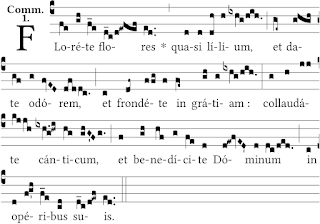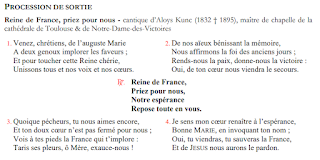And Jupiter is still yellowly [I checked in the OED; e.g. Tennyson's "The fullfaced sunset yellowly/ Stays on the flowering arch of the bough"] shimmering away in the West; I don't believe I saw rising Mercurius (it is just over an hour before sunrise and I've been back for perhaps half an hour)-- where I am the eastern horizon is in so many places obscured by houses and trees and et cetera. Today is the 17th Sunday post Pentecosten, the 1st in October (the Books of the Macchabees began to be read in the lessons at Matins today); it is also the feast of the Holy Guardian Angels although this is commemorated only (for some forty years or so after 1910 it was the other way around: the feast was celebrated and the Sunday commemorated). Both Gospel lessons are taken from Saint Matthew: for the Sunday, 22,34-46 (the homily is from Saint John Chrysostom) and then for the feast 18,1-10 (the homily is from Saint Hilary of Poitiers). The video recording of Holy Mass from Saint-Eugène ought to be at You Tube at this point.
Ah, ha, it had totally slipped my mind that Saint-E. celebrated the feast of the Holy Rosary earlier this morning. Hmm. The first Sunday of October was the date of the feast established by Gregorius XIII in 1573 and Pius X moved it to the 7th (I don't quarrel with the notion that Sundays ought to be kept as Sundays liturgically, nor with the fact that this particular feast is properly moved away from the Sunday). In the liturgical Madison prescribed by Ioannes XXIII, apparently the celebration of the 'external solemnity' happens today and not next Sunday, perhaps because the first Sunday had always been the proper date. I don't know; I've never read an exhaustive description of the rules of 'external solemnities', eh. In any event, I would have risen for 0200 if I had remembered this, tsk.
The jays seem all to have woken up together. And now the crows. It is a few minutes now before sunrise but Dawn is come upon us.
The Schola began with the Litany of Our Lady in the chant de Besançon-- each time they sing this I intend to look about on the Internet; am not sure if it is simply a group of melodies from B. or if there was actually a 'school of B.'. A lovely setting, in any case, which has taken most of the time from its singing to the suscipe deprecationem of the Gloria to vanish from my head.
SACRATISSIMI ROSARII BEATAE MARIÆ VIRGINIS FESTO
Duplex II classis
Introitus. Gaudeámus omnes in Dómino, diem festum celebrántes sub honóre beátæ Maríæ Vírginis: de cujus sollemnitáte gaudent Angeli et colláudant Fílium Dei. Ps. 44, 2. Eructávit cor meum verbum bonum: dico ego ópera mea Regi. V. Glória Patri.
Collecta. Deus, cujus Unigénitus per vitam, mortem et resurrectiónem suam nobis salútis ætérnæ prǽmia comparávit: concéde, quǽsumus; ut, hæc mystéria sacratíssimo beátæ Maríæ Vírginis Rosário recoléntes, et imitémur, quod cóntinent, et quod promíttunt, assequámur. Per eúndem Dóminum nostrum.
Léctio libri Sapiéntiæ. Prov. 8, 22-24 et 32-35. Dóminus possédit me in inítio viárum suárum, ántequam quidquam fáceret a princípio. Ab ætérno ordináta sum et ex antíquis, ántequam terra fíeret. Nondum erant abýssi, et ego jam concépta eram. Nunc ergo, fílii, audíte me: Beáti, qui custódiunt vias meas. Audíte disciplínam, et estóte sapiéntes, et nolíte abjícere eam. Beátus homo, qui audit me et qui vígilat ad fores meas cotídie. et obsérvat ad postes óstii mei. Qui me invénerit, invéniet vitam et háuriet salútem a Dómino.
Graduale. Ps. 44,5,11 et 12. Propter veritátem et mansuetúdinem et justítiam, et dedúcet te mirabíliter déxtera tua. V. Audi, fília, et vide, et inclína aurem tuam: quia concupívit Rex spéciem tuam.
Allelúja, allelúja. V. Sollémnitas gloriósæ Vírginis Maríæ ex sémine Abrahæ, ortæ de tribu Juda, clara ex stirpe David. Allelúja.
+ Sequéntia sancti Evangélii secúndum Lucam. Luc. 1, 26-38. In illo témpore: Missus est Angelus Gábriel a Deo in civitátem Galilǽæ, cui nomen Názareth, ad Vírginem desponsátam viro, cui nomen erat Joseph, de domo David, et nomen Vírginis María. Et ingréssus Angelus ad eam, dixit: Ave, grátia plena; Dóminus tecum: benedícta tu in muliéribus. Quæ cum audísset, turbáta est in sermóne ejus: et cogitábat, qualis esset ista salutátio. Et ait Angelus ei: Ne tímeas, María, invenísti enim grátiam apud Deum: ecce, concípies in útero et páries fílium, et vocábis nomen ejus Jesum. Hic erit magnus, et Fílius Altíssimi vocábitur, et dabit illi Dóminus Deus sedem David, patris ejus: et regnábit in domo Jacob in ætérnum, et regni ejus non erit finis. Dixit autem María ad Angelum: Quómodo fiet istud, quóniam virum non cognósco? Et respóndens Angelus, dixit ei: Spíritus Sanctus supervéniet in te, et virtus Altíssimi obumbrábit tibi. Ideóque et quod nascétur ex te Sanctum, vocábitur Fílius Dei. Et ecce, Elisabeth, cognáta tua, et ipsa concépit fílium in senectúte sua: et hic mensis sextus est illi, quæ vocátur stérilis: quia non erit impossíbile apud Deum omne verbum. Dixit autem María: Ecce ancílla Dómini, fiat mihi secúndum verbum tuum.
The Schola also sang the Ave maris stella at the incensing of the altar at the Offertory.
Offertorium. Eccli. 24, 25; 39, 17. In me grátia omnis viæ et veritátis, in me omnis spes vitæ et virtútis: ego quasi rosa plantáta super rivos aquárum fructificávi.
Secreta. Fac nos, quǽsumus, Dómine, his munéribus offeréndis conveniénter aptári: et per sacratíssimi Rosárii mystéria sic vitam, passiónem et glóriam Unigéniti tui recólere; ut ejus digni promissiónibus efficiámur: Qui tecum.
At the Elevation of the Most Holy Sacrament, the Schola most often sings a setting of O salutaris Hostia; this morning it was M de Villiers' adaption of Alexis Kastorsky's from 1901. It is the custom at Saint-E., and more broadly (or so I understand) in France, to occupy any available 'space' with one form of singing or another when, in many places, silence would be observed.
A lovely Magnificat was sung at Communion time, the Magnificat royal, called du roi Louis XIII, a traditional faux-bourdon at Paris since the 17th century.
Communio. Eccli. 39, 19. Floréte, flores, quasi lílium, et date odórem, et frondéte in grátiam, collaudáte cánticum, et benedícite Dóminum in opéribus suis.
Postcommunio. Sacratíssimæ Genetrícis tuæ, cujus Rosárium celebrámus, quǽsumus, Dómine, précibus adjuvémur: ut et mysteriórum, quæ cólimus, virtus percipiátur; et sacramentórum, quæ súmpsimus, obtineátur efféctus: Qui vivis.
And after the Last Gospel and the Salve Regina misericordiae, at the sortie des clercs, the hymn Reine de France, priez pour nous by Aloys Kunc (1832-1895) who was maître de chapelle at Toulouse and at Notre-Dame-des-Victoires in Paris.
LDVM







Comments
Post a Comment